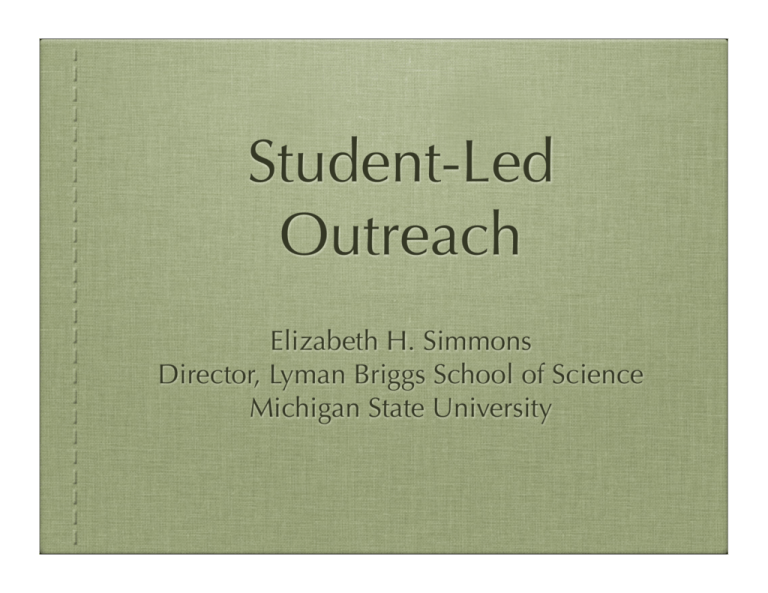talk - Michigan State University
advertisement

Student-Led Outreach Elizabeth H. Simmons Director, Lyman Briggs School of Science Michigan State University Spartan Science Day • A student-initiated science outreach program with faculty participation can be a wonderful community service project for an undergraduate student organization. • This talk discusses a two-year-old program of this kind, that is led by the Briggs Multiracial Alliance at Michigan State University in cooperation with elementary school teachers from Flint, Michigan. Holmes Hall, home to the Lyman Briggs School of Science at MSU since 1967. Lyman Briggs is an undergraduate, residential learning community at MSU, devoted to studying the natural sciences and their impact on society. Its building houses laboratories, classrooms, and student residential, dining, and recreational facilities. With 1750 students, LBS offers the “best of both worlds”: the benefits of a liberal arts college and the resources of a great research university. The faculty and staff of Lyman Briggs LBS graduates, spring 2006. Flint schools & teachers participating in Spartan Science Day Brownell Elementary School Ms. Catanja Harrison Williams Elementary School Ms. Karen LaLonde 50 miles apart 5th grade students visiting from Flint, waiting for the program to begin. Student Organizers from the Briggs Multiracial Alliance (BMA) Farhan Bhatti Jaime Murphy Shaun Wahab Rome Meeks Lisa Peterson These members of the BMA Executive Board conceived of, planned, and executed the program. They made contact with the teachers, arranged transportation and refreshments, recruited faculty & student session leaders and tour guides, and planned the schedules. SPARTAN SCIENCE DAY 2006 Group 3 Agenda 12:00: Students Arrive 12:00 – 12:25: Lunch in West Lower Lounge, Name tag and t-shirt distribution 12:30 – 12:55: Science Theater performance in West Lower Lounge. Students sit with their group. 1:00 – 1:35: Campus Walking Tour 1:40 – 2:00: Making green-slime with Dr. LaDuca outside of Chemistry lab. 2:00 – 2:30: Microscope Demonstration with Dr. Smith, Dr. Luckie, and Dr. Urquhart. Bring students to entrance of Sanford Natural Area. Give them a quick explanation of the area using your pamphlet provided in your packet. Allow the students 5 minutes to look for 2 specimens in the natural area (leaves, bugs, etc.) Then back to use the microscopes! 2:30 – 2:50: Dr. Reiheld’s Philosophy of Science Activity 2:50 – 3:10: Dr Simmons & Dr. Chivukula’s Subatomic Physics Activity 3:10 – 3:20: Visit a student’s dorm room 3:20 – 3:30: Walking tour of Holmes Hall MSU’s student-run Science Theatre performs demonstrations: ... including a Dance of the Sound Vibrations... ... Flint students get in on the act! Making slime with Dr. LaDuca Microscopes & Cells with Drs Luckie, Smith & Urquhart Handouts from Subatomic Physics with Drs. Simmons & Chivukula -- and Honors Student Garrett Warnell. Philosophy of Science with Ms. Alison Reiheld • What is a technology ? (a skill or thing that uses what we know to solve human problems) • What uses are acceptable ... and what factors matter? (fairness? harm to self ?) Perspective from Flint teachers • Many of my students come from homes where no one has ever gotten past high school. • When I talk to my students about college and career plans they say “My mom says poor kids can’t go to college....” This trip helps counter what they’re hearing at home. • Many students didn’t know what a college was before this day and had never set foot in one before... they left the program saying “I want to go there!” • The MSU students were awesome with the kids, even with those who usually present behavior problems. There was a spirit of camaraderie. • One of the best field trips EVER! Perspective from MSU faculty • ... the [document] projector itself blew them away, incidentally; in all groups, most kids did not know such a thing existed and in some groups none did.... • [P]eople tend to underestimate the capacity of primary and secondary school students to think critically or philosophically with any kind of rigor....All they need is a concrete place to start and some open-ended guidance. • Most of the kids got pretty involved with the hands-on activities and a few asked lots and lots of enthusiastic questions. Perspective from Student Organizers • [T]he kids we were targeting are among the least privileged kids in the entire state - some coming from families that earn less than $8000 per year. Many of those kids have no idea what it means to go to college .... I am hopeful that as they grow up, they’ll remember the fun they had at MSU and will see college as a realistic goal, not as an unrealistic dream. • At the end of the day, just before the kids left, we asked how many of the kids would like to go to college someday. And when almost every single one of them raised their hand, that gave me all the satisfaction and reward that I needed for all the work that was put into it. • Getting ten and eleven year old kids excited about science experiments, physics demonstrations and the use of technology could be paramount to their desire for education. • I know I gained a greater sense of appreciation for my education, and those that have guided me along the way, i.e. parents and teachers. End of the Program (Can you spot the physics handout?) New Friends...








